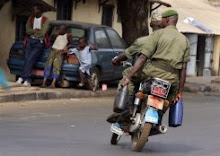Guinean soldiers have been looting shops, breaking into homes and firing indiscriminately at people who ventured onto the streets of the capital Conakry, residents say, one day after scores were killed and hundreds injured in a military crackdown on a demonstration on 28 September.
“They are going around sowing terror,” Lamine*, a resident of the Cosa neighbourhood, told IRIN. “This is clearly their intention – to terrorize the people.”
He said he saw two young men shot dead when soldiers opened fire in Cosa on 29 September. The streets of Conakry were mostly deserted except for groups of police and military, residents said.
Several residents of Conakry told IRIN they saw soldiers breaking into shops and forcing their way into homes, stealing money, mobile phones and other belongings.
Most people IRIN spoke with were holed up in their homes, not daring to go out. “We are hostages of this military,” one said. “There is absolutely nothing we can do.”
Following the violent military crackdown on a 28 September demonstration against the candidacy of junta leader Moussa Dadis Camara, in which an estimated 157 people were killed and more than 1,000 injured, Camara told the media some elements of the army were “out of control”.
On 29 September Camara called for two days of national mourning.
Shops closed
Shops, markets and petrol stations were closed on 29 September. “People are just too afraid to open their businesses,” Lamine said.
In many cases, he said, men instead of women – who usually do the food shopping – went in search of condiments and whatever they could find for the daily meal.
Guineans are among the poorest people in the world and most do not have the means to buy food for more than one day at a time.
“If this continues we will see people going hungry,” Lamine told IRIN.
Petrol, usually about 4,500 Guinean francs (90 US cents) per litre, is being sold by youths on the street for 8,000-15,000 Gf, a local chauffeur told IRIN.
“Save us”
The international community has denounced the violent crackdown on the 28 September demonstration. The Economic Community of West African States (ECOWAS) commission said on 29 September it “strongly condemns” the repression.
“I do not want to hear the international community simply spouting words like ‘we condemn’,” Conakry youth Amadou* told IRIN. “They must act. They must do something. Save us.”
He said he wanted to see “a total embargo” imposed on Guinea and perpetrators of the violence brought to justice.
“If there is not an international arrest warrant put out on them they will kill all Guineans.”
On 29 September Guinean Interior and Political Affairs Minister Frédéric Kolié said in a statement that 57 people had lost their lives on 28 September – 53 due to asphyxiation in a stampede and “four by stray bullets”.
Source: IRIN
“They are going around sowing terror,” Lamine*, a resident of the Cosa neighbourhood, told IRIN. “This is clearly their intention – to terrorize the people.”
He said he saw two young men shot dead when soldiers opened fire in Cosa on 29 September. The streets of Conakry were mostly deserted except for groups of police and military, residents said.
Several residents of Conakry told IRIN they saw soldiers breaking into shops and forcing their way into homes, stealing money, mobile phones and other belongings.
Most people IRIN spoke with were holed up in their homes, not daring to go out. “We are hostages of this military,” one said. “There is absolutely nothing we can do.”
Following the violent military crackdown on a 28 September demonstration against the candidacy of junta leader Moussa Dadis Camara, in which an estimated 157 people were killed and more than 1,000 injured, Camara told the media some elements of the army were “out of control”.
On 29 September Camara called for two days of national mourning.
Shops closed
Shops, markets and petrol stations were closed on 29 September. “People are just too afraid to open their businesses,” Lamine said.
In many cases, he said, men instead of women – who usually do the food shopping – went in search of condiments and whatever they could find for the daily meal.
Guineans are among the poorest people in the world and most do not have the means to buy food for more than one day at a time.
“If this continues we will see people going hungry,” Lamine told IRIN.
Petrol, usually about 4,500 Guinean francs (90 US cents) per litre, is being sold by youths on the street for 8,000-15,000 Gf, a local chauffeur told IRIN.
“Save us”
The international community has denounced the violent crackdown on the 28 September demonstration. The Economic Community of West African States (ECOWAS) commission said on 29 September it “strongly condemns” the repression.
“I do not want to hear the international community simply spouting words like ‘we condemn’,” Conakry youth Amadou* told IRIN. “They must act. They must do something. Save us.”
He said he wanted to see “a total embargo” imposed on Guinea and perpetrators of the violence brought to justice.
“If there is not an international arrest warrant put out on them they will kill all Guineans.”
On 29 September Guinean Interior and Political Affairs Minister Frédéric Kolié said in a statement that 57 people had lost their lives on 28 September – 53 due to asphyxiation in a stampede and “four by stray bullets”.
Source: IRIN

No comments:
Post a Comment